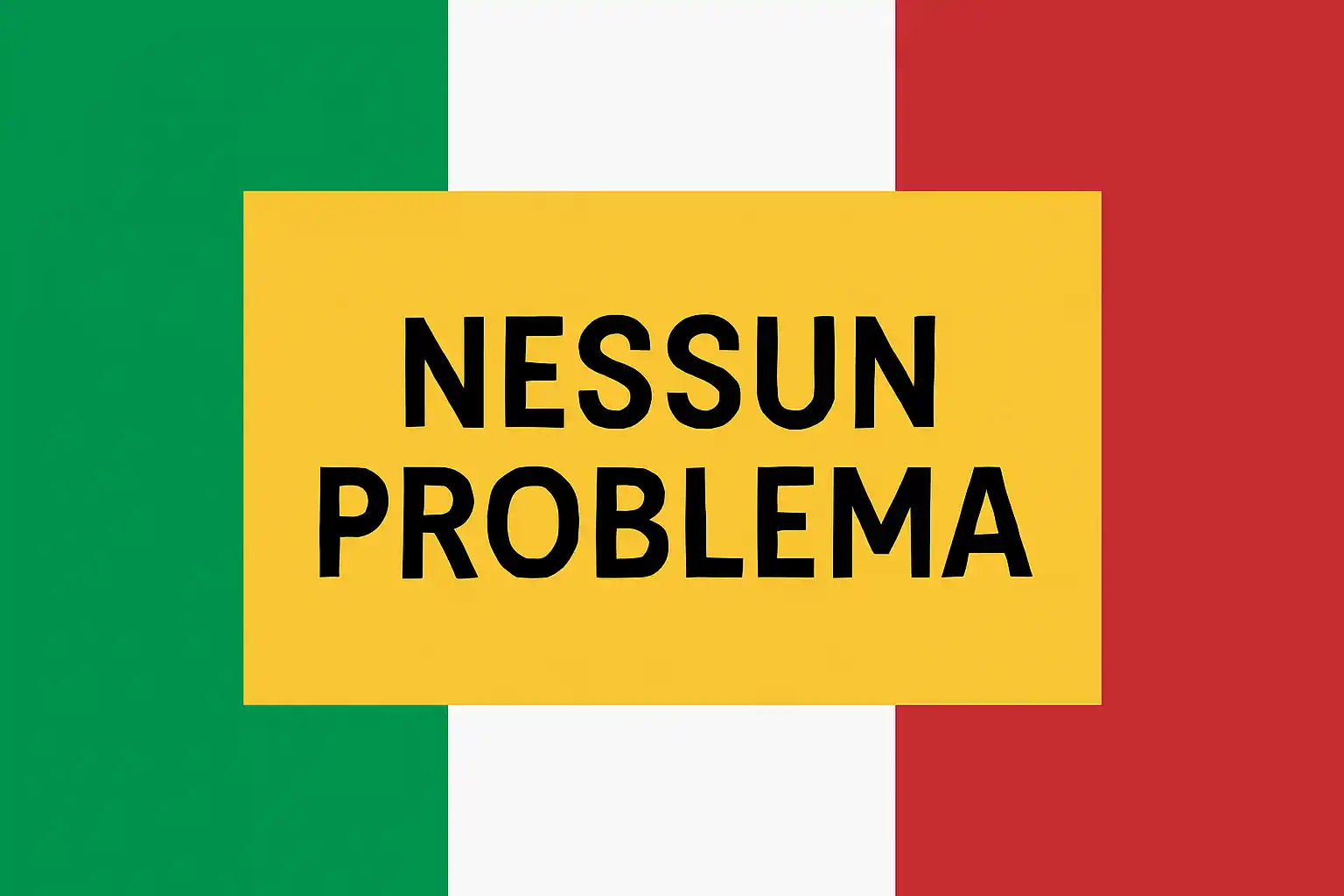When an Italian responds to a setback with “Nessun problema” (No problem or all good), they’re showing a fundamental cultural philosophy about problem-solving that separates winners from everyone else. This attitude, in part rooted in Italian culture’s focus on finding solutions rather than dwelling on obstacles, represents a competitive advantage that compounds daily into extraordinary career differentiation.
Coffee spills on your presentation? Nessun problema. Flight delayed before critical meeting? Nessun problema. Major client crisis at 5 PM Friday? Nessun problema. The Italian approach isn’t denial, it’s immediately positioning yourself as the person who solves problems rather than the person paralyzed by them.
James Clear’s research in “Atomic Habits” demonstrates that 1% daily improvements compound into remarkable transformations over time. The “nessun problema” mindset delivers exactly this: every problem you approach as an opportunity to demonstrate capability rather than express frustration builds your reputation as someone who delivers solutions when others deliver excuses.
The Problem-Solver Premium: Why Winners Think Differently
Research from Stanford psychologist Carol Dweck’s “Mindset” reveals fundamental differences between those who view challenges as threats versus opportunities. Her decades of research demonstrate that individuals with growth mindsets—those who see problems as chances to develop capabilities—consistently outperform those with fixed mindsets who view challenges as exposing inadequacies.
The Italian “nessun problema” philosophy embodies this growth mindset culturally. When Italians face obstacles, their immediate response focuses on solutions rather than complaints. This isn’t about ignoring difficulties—it’s about redirecting mental energy from problem identification to problem resolution.
Consider two professionals facing a delayed shipment threatening client delivery deadlines. The first spends energy complaining about logistics failures and preparing excuses. The second immediately thinks “nessun problema” and redirects energy toward backup suppliers, expedited shipping, and temporary workarounds. By day’s end, the first has a detailed explanation of failure. The second has solved the problem and enhanced their reputation as someone clients depend on during crises.
The Career Compounding Effect: How 0.1% Daily Wins Everything
The mathematics of compounding explain why the “nessun problema” mindset creates winner-takes-all outcomes. If you improve your problem-solving reputation by just 0.1% daily through consistent solution-focused responses, you’ve improved 44% over one year. After five years, you’re operating at a completely different level than peers who remained static.
When critical projects need leadership, you’re selected because you’ve built a reputation for solving problems rather than escalating them. When promotion opportunities arise, you’re remembered as the person who delivers solutions during crises. When clients face challenges, they call you first because your “nessun problema” approach creates confidence.
Ryan Holiday’s “The Obstacle Is the Way” explores how historical figures from Marcus Aurelius to Theodore Roosevelt transformed obstacles into advantages through this exact mindset. Successful leaders don’t just overcome problems—they use them as opportunities to demonstrate capabilities that build legendary reputations.
The Italian Cultural Foundation
Italian culture developed the “nessun problema” philosophy through centuries of surviving complex challenges with limited resources. Scarcity teaches you problem solving, and prepares you to deal with limitation.
In Italian business culture, responding to challenges with “nessun problema” signals confidence in your capabilities, commitment to finding solutions, and refusal to waste energy on complaints. It’s about immediately establishing yourself as the person who will resolve problems, not pretend they don’t exist.
This extends to everyday frustrations. Coffee shop gets your order wrong? Nessun problema—you politely correct it rather than creating drama. Colleague misses a deadline affecting your work? Nessun problema, you adjust your timeline rather than escalating conflicts. Each small demonstration reinforces your reputation as someone who makes things easier rather than harder.
Training Your Nessun Problema Reflex
Developing the “nessun problema” mindset requires conscious practice until it becomes automatic. Start by monitoring your initial responses to unexpected challenges. Notice when your first reaction is frustration, complaint, or excuse-making rather than solution-seeking.
When problems arise, literally say “nessun problema” out loud—even if just to yourself. This verbal commitment triggers your brain to shift from problem-focus to solution-focus. Then immediately ask “What’s the fastest path to resolution?” rather than “Why did this happen?” or “Whose fault is this?”
Practice with small frustrations first. Traffic delay? Nessun problema, use the time productively. Technology glitch? Nessun problema, find alternative approaches. These small wins build the mental muscle for handling larger challenges with the same solution-focused approach.
Why Problem-Solvers Win Disproportionately
Markets increasingly operate on winner-takes-all dynamics where small advantages compound into dramatic differences. The professional who consistently demonstrates problem-solving capabilities doesn’t just do slightly better, they capture disproportionate opportunities because they’re seen as rare and valuable.
When you build a reputation for “nessun problema” thinking, you become the person people call for problem sovling, the colleague others want on their teams, and the professional clients request specifically.
Transform every problem into reputation-building opportunity by immediately shifting to solution-focus without ever complaining. Make “nessun problema” your verbal signature. When colleagues or clients bring you challenges, respond with genuine confidence that solutions exist rather than matching their stress.
The Italian understanding reveals a profound truth: in environments where everyone faces similar challenges, the winners are simply those who solve problems while others complain about them. Master the “nessun problema” mindset, and you transform every challenge into a compounding advantage that separates you from everyone else.
The author is developing “The Italian Advantage,” exploring how Italian wisdom creates unshakeable competitive advantages for ambitious leaders in the digital age.

